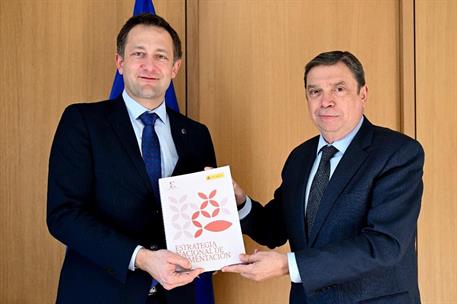Pedro Sánchez, on a possible trade conflict: "We will be firm, we will defend our farmers, stockbreeders and fishermen and their cooperatives"
President's News - 2025.2.6
iHub La Vega Innova, San Fernando de Henares (Madrid)
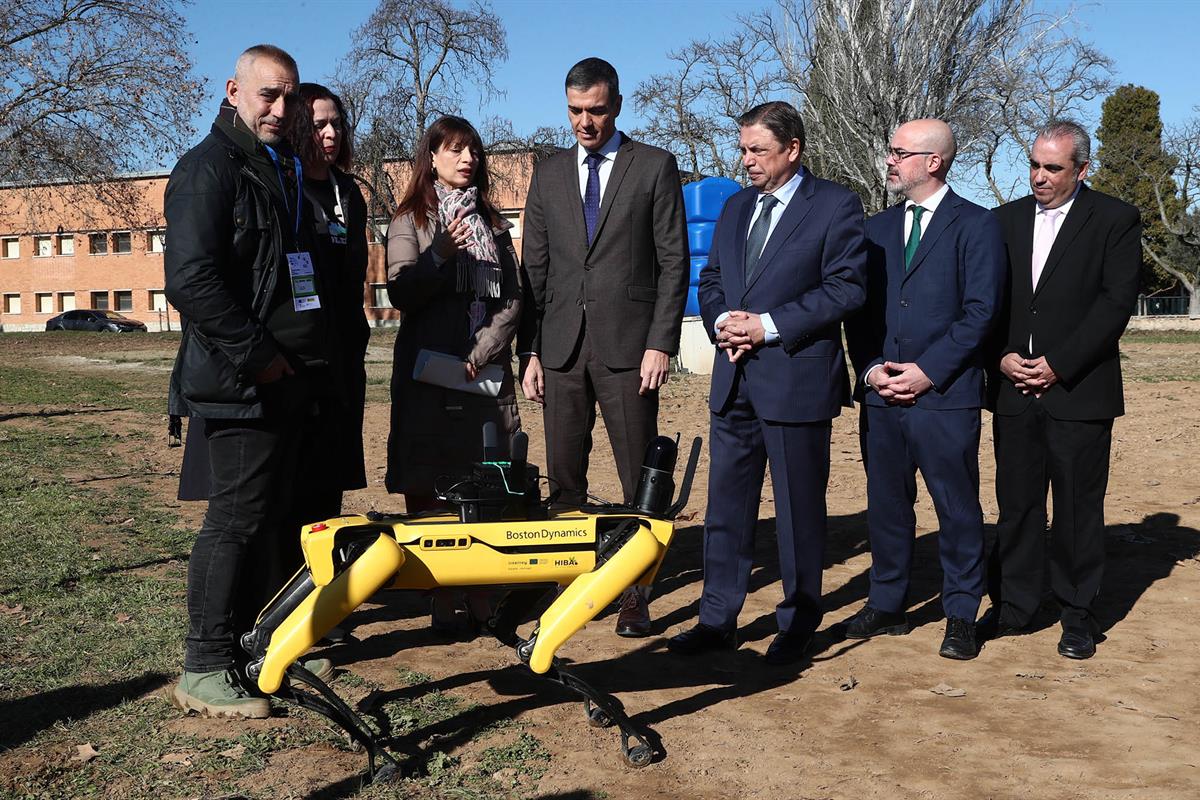 The President of the Government of Spain, Pedro Sánchez, during the field visit to several experimental demonstrations at the outdoor facilities of the iHub La Vega Innova (Pool Moncloa / Fernando Calvo)
The President of the Government of Spain, Pedro Sánchez, during the field visit to several experimental demonstrations at the outdoor facilities of the iHub La Vega Innova (Pool Moncloa / Fernando Calvo)
The President of the Government of Spain, Pedro Sánchez, warned that "in a trade war there are no winners, we all lose", which is why Spain will always have its "hand outstretched" to avoid trade wars and tariff escalations. Nonetheless, he stated that the Government of Spain will be "firm" and will defend farmers, stockbreeders, fishermen and their cooperatives". He did so during the closing ceremony of the presentation of the "necessary and pioneering" National Food Strategy, held at the iHub La Vega Innova in San Fernando de Henares (Madrid), which was also attended by the Minister for Agriculture, Fisheries and Food, Luis Planas.
Pedro Sánchez indicated that the biggest challenges facing the agri-food sector are climate change, "a reality that is denier-proof and requires courageous mitigation and adaptation policies", and the fact that it is still suffering from the impacts on supply chains, aggravated by the war in Ukraine and the "turbulence in international trade, with unforeseeable consequences". He said that "in a trade war there are no winners, we all lose, especially when food is a trump card: those who suffer most are always the most vulnerable".
Given this scenario, he argued that "unity is strength", which is why he believes that "now, more than ever, the EU must show unity to respond to any eventuality", adding that "we must be prepared to take the right decisions in the face of a potential trade conflict that is not in Europe's interest and that Europe does not want. We will be firm, have no doubt about it. We will defend our farmers, stockbreeders and fishermen and their cooperatives, and I know that we will have the agricultural organisations on our side," he said. He also made it clear that Spain will always have "its hand outstretched to avoid trade wars and tariff escalations that only impoverish us all".
"Extraordinary moment" for the sector
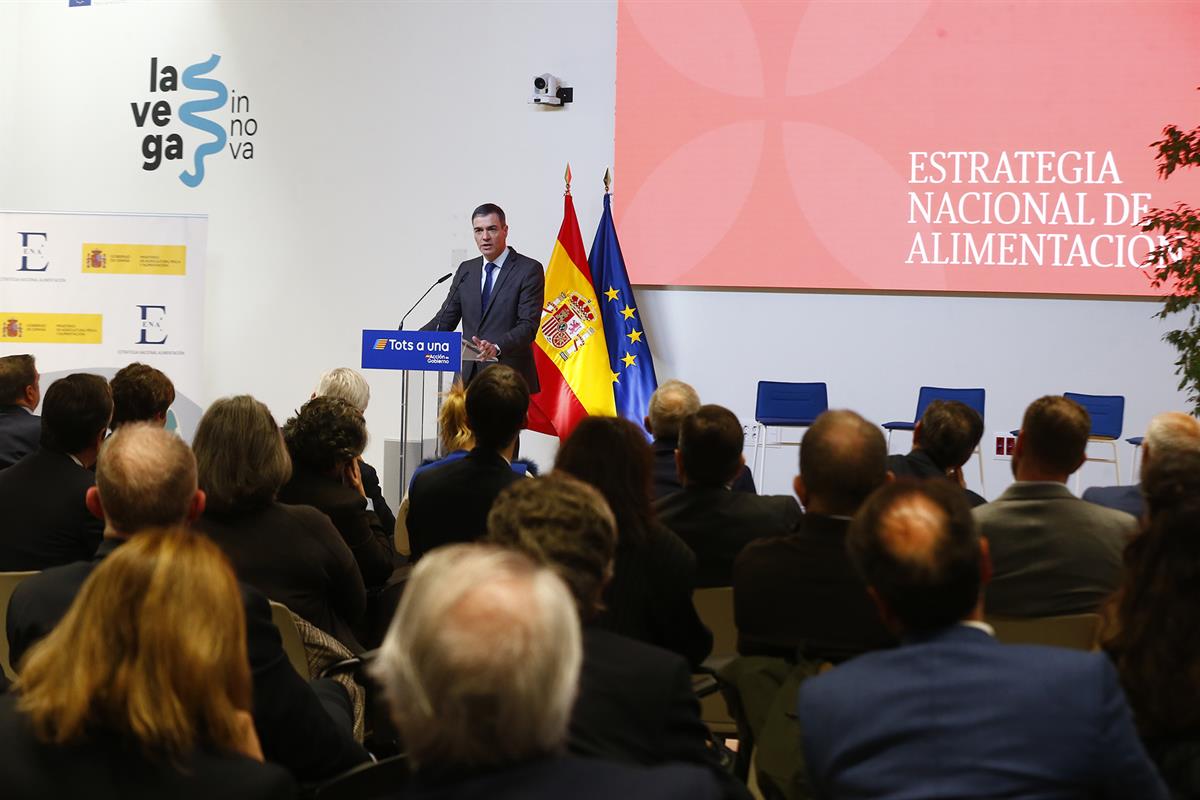 The President of the Government of Spain, Pedro Sánchez, speaks at the presentation of the "National Food Strategy" | Pool Moncloa / José Manuel Álvarez
The President of the Government of Spain, Pedro Sánchez, speaks at the presentation of the "National Food Strategy" | Pool Moncloa / José Manuel Álvarez
The president celebrated the "extraordinary moment of the agri-food sector", with a historic record of almost €75 billion in exports, which places Spain as one of the seven major exporting powers worldwide, and fourth at European level, and the country with the most favourable trade balance by exporting almost €20 billion more than it imported.
This explains in great measure the increase in farm incomes, at more than €37 billion in 2024, 70% more than a decade ago, contributing to the whole agri-food and fisheries system, from production to consumption, accounting for up to 10% of GDP and supporting 2.9 million jobs. These figures are "coherent with the extraordinary economic moment that Spain is experiencing" as the leader for economic growth in Europe for the last two years, with forecasts showing that it "will continue to lead in 2025", said Pedro Sánchez. "Spain is making a real comeback", he affirmed, adding that "this is the best way for Spain to face a future full of challenges with confidence", he said.
National Food Strategy: quality and safety
The chief executive presented the National Food Strategy promoted by the Government, a "necessary and pioneering effort" that was "conceived in dialogue and agreement" with a "strategic vision in the medium and long term" as opposed to "short-termism". It is a roadmap to boost the sector's influence in Europe through its "quality, safety and innovation". The strategy will promote a "safe, sustainable, healthy, competitive and socially just" food system throughout the whole cycle, from production to final consumption. Pedro Sánchez thanked the "great effort" of the Ministry of Agriculture and acknowledged the work of the agricultural unions in defence of farmers, fishermen and stockbreeders.
The Strategy is structured around six major challenges: food security, sustainability, strengthening rural and coastal areas, healthy food, innovation and technology, and consumers.
On food security, he explained that it is linked to open strategic autonomy, which is an "absolute priority for the European Commission in this new legislature, which Spain fully shares". He went on to state that "Europe's very life is at stake in strengthening its sovereignty. It is a question of accepting that our food supply cannot depend on what anyone in any corner of the world decides, and neither can the future of our countryside be left to the whim of tariffs imposed for pure opportunism", anticipating that the government will act regarding food as it has done in the past with energy. To this end, suppliers will be diversified, national capacities will be strengthened and work will be done to gain competitiveness, as is already being done to boost the production of green fertilisers, an example of which is the investments in Puertollano and in Aragon with public-private collaboration.
Sustainability and territorial cohesion: Family Farming Law
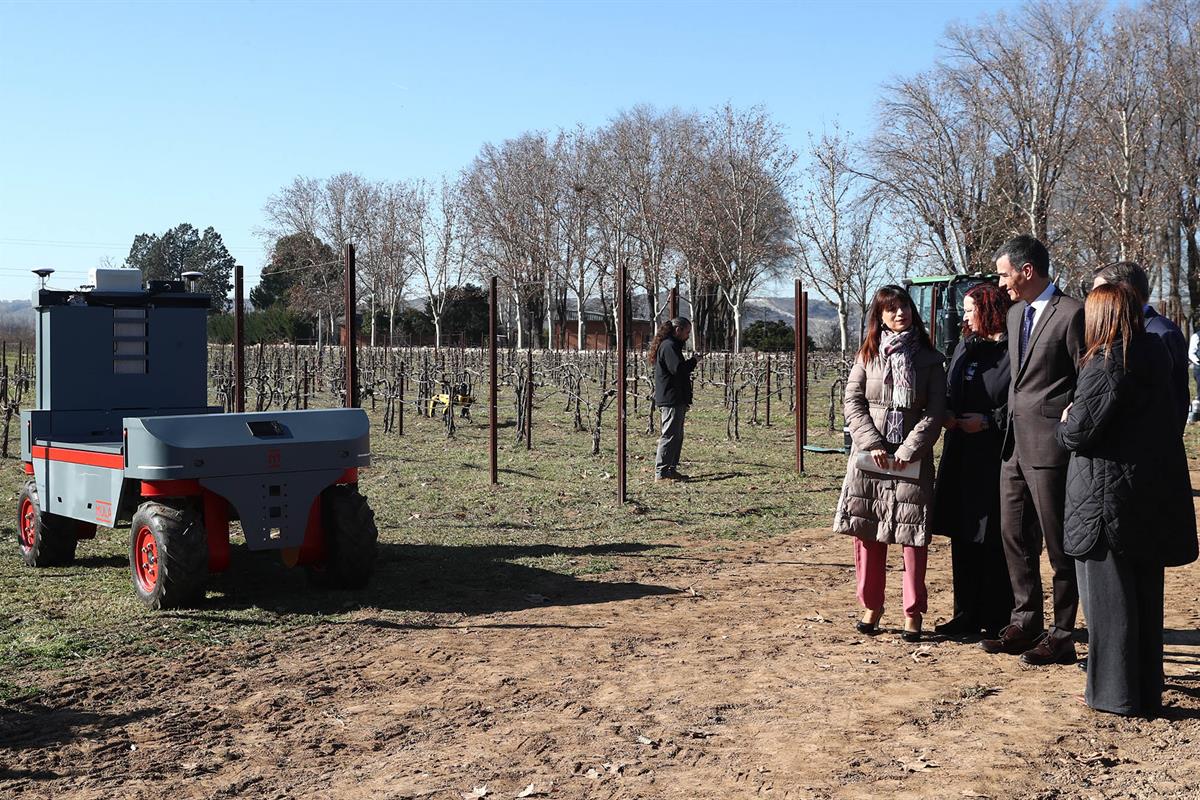 The President of the Government of Spain, Pedro Sánchez, together with the Minister for Agriculture, Fisheries and Food, Luis Planas, during the field visit to several experimental demonstrations at the outdoor facilities of the iHub La Vega Innova | Pool Moncloa / Fernando Calvo
The President of the Government of Spain, Pedro Sánchez, together with the Minister for Agriculture, Fisheries and Food, Luis Planas, during the field visit to several experimental demonstrations at the outdoor facilities of the iHub La Vega Innova | Pool Moncloa / Fernando Calvo
In terms of sustainability, he argued that the system should be "green, efficient and responsible", pointing out that Spain is the second country in the EU and the sixth in the world with the largest area dedicated to organic farming. In fact, 80% of irrigated land is already using efficient systems following an "unprecedented" investment of €2.4 billion by 2027. He also stressed the importance of ensuring social sustainability with "decent working conditions" and combating food waste.
The Strategy will also focus on rural and coastal areas, improving the profitability and competitiveness of producers with more training in digitalisation and technology and, "above all, with more support for competitive family and professional agriculture". There are currently more than 900,000 farms linked to family agriculture and stockbreeding, which are the "main raison d'être" of the new Family Farming Law that "we are going to promote from the Executive and which will go ahead in the current legislature", contributing to territorial cohesion, the president advanced.
Healthy food, innovation and consumers
The National Food Strategy will address the challenge of ensuring healthy eating "for all" and combating "very harmful eating habits to be tackled in all spheres", in line with the National Strategic Plan for the Reduction of Childhood Obesity. It will also focus on innovation and technology, an area in which Spain is already a benchmark, with more than 2,500 initiatives underway in agricultural research and innovation projects, and a "large innovative ecosystem" of 20 leading technology centres, 50 universities and specialised business associations, science parks, incubators and start-ups, and more than 800 'agrotech' technology companies in operation. Last, he stressed that the consumer will continue to be empowered with reliable information on labelling rules, because in this area "the fake news virus also operates", with 30% of fake news on social networks related to the agri-food industry.
The president stressed that in difficult times "Spain has been able to respond with an unprecedented shield of protection" for the agri-food sector, with more than €4 billion in extraordinary support for the primary sector to mitigate the effects of the drought and the increase in costs resulting from the war in Ukraine in 2022 and 2023, and now with more than 7,800 beneficiaries to compensate for losses on farms and irrigated land affected by the DANA. "The Government is not only there to cushion blows; it is also there to accompany, anticipate scenarios and offer positive horizons", he added.
Luis Planas stresses the importance of "solid government action" in the face of the sector's challenges
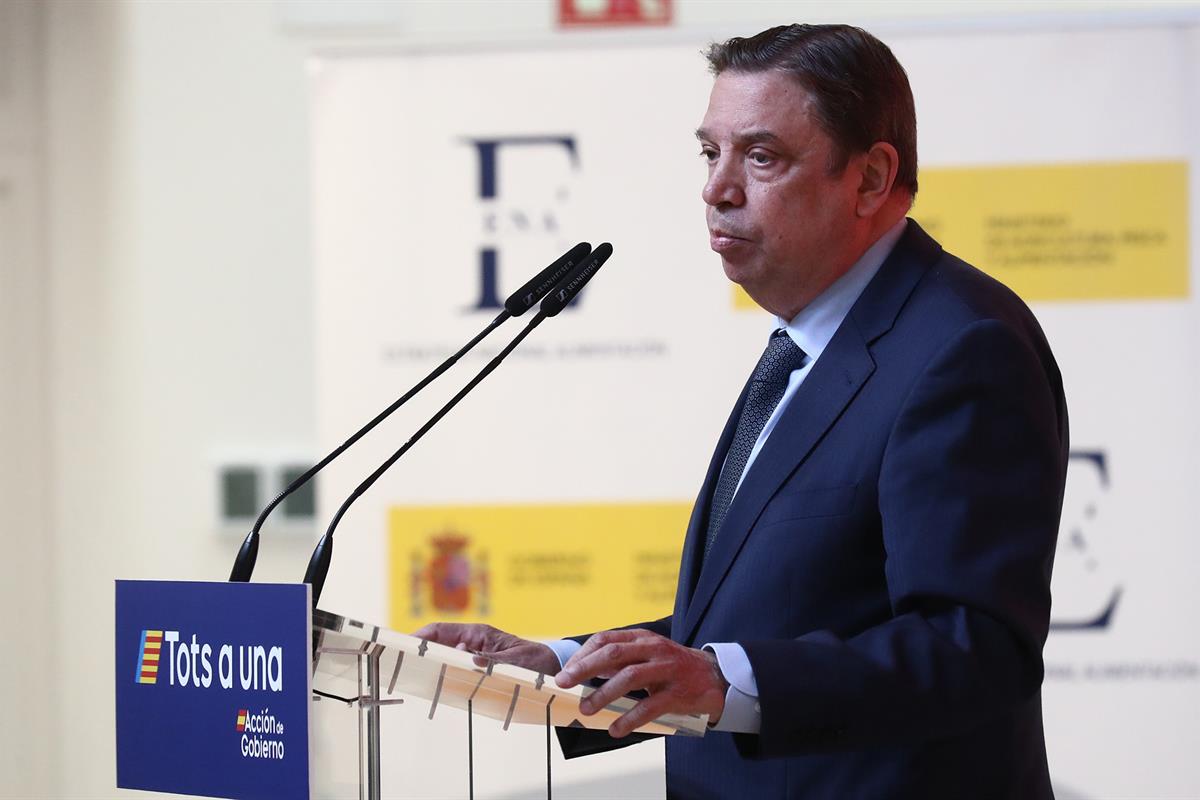 The Minister for Agriculture, Fisheries and Food, Luis Planas, at the presentation of the "National Food Strategy" | Pool Moncloa / Fernando Calvo
The Minister for Agriculture, Fisheries and Food, Luis Planas, at the presentation of the "National Food Strategy" | Pool Moncloa / Fernando Calvo
For his part, the Minister for Agriculture, Fisheries and Food, Luis Planas, explained that the Strategy has been drawn up following a broad public and sectoral debate and 40 meetings, and analyses the "challenges of the future" in terms of security and supply, sustainability of production, efficiency in distribution and the application of new technologies to the food chain.
To this effect, he stressed the need for "solid government action with national and European public policies" to support the sector in the face of the great challenges of profitability, sustainability, adaptation and responses to climate and geopolitical challenges. In this line, he pointed out that the Government has already delivered the text of the Strategy to the European Commission following its passage through the Council of Ministers, as "Spain's contribution to the vision of agriculture and food in Europe", which the College of Commissioners will make public in the coming weeks.
Non official translation





